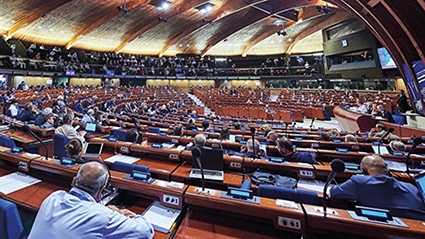Russia Regains PACE Voting Rights
On Monday, June 24, member states of the Parliamentary Assembly of the Council of Europe (PACE) voted on whether to restore the voting rights of Russia in the body. PACE is the parliamentary arm of the Council of Europe which focuses on democracy, human rights, and the rule of law.
In the summer opening session, the assembly voted on a report that both restored Russia’s voting rights and limited PACE’s rights to impose similar sanctions in the future. The vote brought Russia back into good standing in the body 118 – 62, with 10 abstentions.
Supporters of Russia’s re-enfranchisement included German Chancellor Angela Merkel and French President Emmanuel Macron under the premise that having Russia engaged on controversial issues is better than excluding them from the dialogue.
Also voting unanimously for the reinstatement was: Spain, Portugal, Ireland, Italy, Serbia, Cyprus, Austria, Iceland, Norway, Turkey, and Azerbaijan. Unanimously opposing the vote: Ukraine, Latvia, Lithuania, Estonia, and, unsurprisingly, Georgia.
The vote preempted Wednesday’s election for PACE secretary-general. Russia, if not allowed to participate, Russia threatened it would pull out of the assembly all together. Leaving PACE would mean that Russian citizens would not be able to appeal to the European Court of Human Rights. That was the main reason Amelie de Montchalin, French Secretary of State in charge of European Affairs, gave for her country’s vote. “We must not confuse citizens' rights and geopolitics,” she explained to France’s CNews.
Human rights-focused NGO ‘The Netherlands Helsinki Committee’ released a statement in December urging that Russia not be allowed to walk away from PACE, saying “Russia's departure from the Council would deny Russian citizens protection and justice provided by the Court — worsening human rights in the country…It would result in a lack of protection provided by the Convention and the Court for inhabitants of Russia-controlled Crimea. It would remove levers for continued political and legal pressure on Russia over its aggressive operations in neighboring countries.”
Additionally, Russia contributes EUR 33 million annually to PACE’s budget, which it did not pay during the time its voting rights were suspended. Euronews reports that Russia has “no intention of paying EUR 75 million in outstanding subscription fees, covering the period of its suspension.”
On the opposing side, Oleksandr Scherba, Ukraine’s ambassador to Austria, Tweeted before the vote on Monday, “Russia plans to roll into PACE like it rolled into Crimea: unpunished, arrogant and largely unopposed.”
On Tuesday, Georgian Foreign Minister David Zalkaliani Tweeted “Sad decision by @PACE_News! Like back in May, during the @coe Ministerial in Helsinki, Georgia principally opposed this decision. We are consistent to our position!”
Russia’s voting rights in the assembly were stripped in 2014 after the invasion and annexation of Ukraine’s Crimean Peninsula, and financial and military support for separatist fighters in Eastern Ukraine.
On Wednesday, the official Georgian delegation to PACE walked out of the assembly hall in Strasburg in protest of the decision to restore Russia’s voting rights. Standing with Georgia, representatives from Ukraine, Estonia, Latvia, Lithuania, Poland and Slovakia also left the session. On behalf of the seven countries, Volodymyr Ariev, the Head of the Ukrainian delegation, announced that they are returning to their home countries to hold negotiations with their governments regarding next steps for interactions with PACE.
After the vote was officially confirmed, Ukrainian representative Oleksiy Honcharenko announced his delegation’s departure in a dramatic speech, saying that PACE had “sold its values” and “lost the hearts” of millions of people. “When Putin re-starts killing, you will also be responsible for that,” warned Honcharenko.
The restoration of Russia’s voting rights in PACE is the first set of major Western sanctions on Russia to be lifted since a wave of sanctions and restrictions hit Moscow in response to the Annexation of Crimea in March 2014.
By Samantha Guthrie
Image source: Council of Europe












